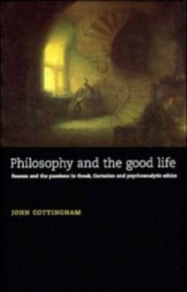Philosophy and the good life
Reason and the passions in Greek, Cartesian
and psychoanalytic ethics
by John Cottingham 
‘John Cottingham’s masterful book is [written] . . . with pungency, elegance and an unpretentious seriousness. Few philosophers could read this book without learning a lot, and without wanting to think further about the important issues it raises.’
[Roger Crisp, Philosophical Books]
‘Fascinating . . . an excellent instance of a historically oriented treatment of a number of important substantive issues in ethics . . . Cottingham is to be warmly applauded for his humane and resounding defence of the project of [exploring how] philosophy and psychoanalysis can converge or co-operate in advancing our thinking about how we want to live.’
[Raymond Geuss, Philosophy]
‘A delight to read . . . The discussion of what Descartes himself really thought on the question of the relation of mind to consciousness is a revelation.’
[Sebastian Gardner, University of London]
‘The importance of the questions which are raised, the clarity of the argument and the broadness of perspective, make it a must-read for anyone who is curious to know whether philosophy has anything to say about happiness.’
[Christine Tappolet, Mind]
‘Rich and wise and emotionally engaged . . . Cottingham’s book is humane, learned, ambitious, original and beautifully written. Read it.’
[Timothy Chappell, Philosophical Quarterly]
‘A fine example of a sustained essay in ethics that is centrally influenced by psychoanalytic thinking.’
[Jonathan Lear, International Journal of Psychoanalysis]
Contents
One: Philosophy and how to live
1 The Project
2 Synoptic ethics
3 Twentieth-century ethics and the professional retreat
4 Modern normative ethics
5 The revival of virtue ethics and the limits of reason
Two: Ratiocentric ethics
1 The fruits of philosophy
2 The ethics of reason in Plato and Aristotle
3 Reason and self-mastery
4 Stoic detachment and Epicurean tranquillity
Three: The ethics of science and power
1 The Cartesian revolution: mathematical transparency and arbitrary law
2 Ethics for man in an alien universe
3 Morality and the new method
4 Cartesian anthropology
5 The role of the passions
6 Fortune, externals and the will
Four: Ethics and the challenge to reason
1. The eclipse of reason
2 Psychoanalysis and its credentials
3 The concept of the unconscious and its historical antecedents
4 Unconscious processes and manifestation
5 Psychoanalysis and the ethical domain
6 The transformation of the self
7 Akrasia and transformational analysis
8 Reason, integration and self-awareness
Cambridge: Cambridge University Press, 1998. xiii+230pp.
ISBN 978-0521-473101(hb);
978-0521-478908(pb); 978-0511-886638 (eBook)


